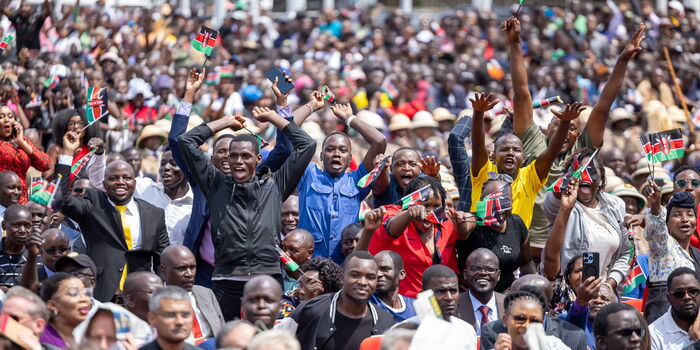The second year of President William Ruto’s administration was characterised by several scandals that tainted the reputation of senior government officials.
Despite interventions, the scandals left behind a lasting effect on several government projects as Kenyans lost trust in the programmes.
At Kenyans.co.ke, we take a look at some of these scandals that caught the attention of many people both locally and internationally.
President William Ruto addressing congregants during an interdenominational church service in Kimana, Kajiado County on Sunday, December 1, 2024.
PCS
Fertiliser Scandal
The supply of a substandard fertiliser in the form of a soil enhancer in April and May this year threatened to derail President Ruto’s agenda.
The incident emerged after several farmers across the country raised concerns over the quality of the fertiliser supplied to them. Tests conducted by the Kenya Bureau of Standard confirmed that indeed the fertiliser supplied to farmers was of low quality.
The unfolding led to the immediate suspension of several government officials and a special motion fronted to remove the then Agriculture Cabinet Secretary Mithika Linturi.
President Ruto in one of his rallies cautioned those involved in the procurement and supply of fertiliser that they would face dire consequences including prosecution.
The Head of State, however, assured farmers who received the substandard fertiliser that they would be compensated after the government imported a new consignment.
Edible Oil Scandal
In September this year, the Kenya National Trading Corporation (KNTC) came under scrutiny after reports emerged that about 32 million litres of cooking oil which had been flagged by the Kenya Bureau of Standard (KEBS) accessed the market.
KEBs Managing Director Esther Ngari while appearing before the parliamentary committee of the National Assembly on September 19, informed the lawmakers that the cooking oil was never authenticated by the agency.
The government reportedly imported 53 million litres of cooking oil from Indonesia, Malaysia, and Egypt between May and August last year.
According to Ngari, 44 containers out of the 73 imported oil containers never met the requisite KEBS requirements.
Ngari informed the MPs that the cooking oil failed to meet the minimum requirement of vitamin A and other essential nutrients.
Adani Deals
In the wake of calls for the renovation of the country’s main airport, the government for the better part of this year came under criticism after contracting Adani Group, an Indian conglomerate to repair the Jomo Kenyatta International Airport and the country’s electricity lines.
The decision to grant Indian billionaire Gautam Sdani the headstart to renovate JKIA sparked widespread outrage from Kenyans particularly aviation workers who protested the move citing threats to their jobs.
Despite the protests, the government went ahead to sign a Ksh90 billion deal for the repair of the country’s electricity lines with the Energy and Petroleum Cabinet Secretary Opiyo Wandayi exuding trust in the Indian firm.
However, after months of uproar by Kenyans, President Ruto on November 21 formally announced the cancellation of the Ksh338 billion deal.
While issuing a State of the Nation address at the parliament buildings, President Ruto directed CS Wandayi and his transport counterpart Davis Chirchir to ensure the procurement of the two deals was halted.
The announcement was received with joy among Kenyans who commended the Head of State for his bold move.
Finance Bill 2024
The tabling of the Finance Bill 2024 sparked one of the heightened protests in the country’s history after youthful protesters took to the streets to protest the government’s move to propose a raft of tax measures.
While protesting, Kenyans raised concerns over the government’s plan to increase taxes on essential commodities including bread and milk.
The demonstrations which began as peaceful protests quickly turned violent after the government decided to deploy police officers to man the demonstrators.
To stop further escalation of the protests, the officers began pelting the demonstrators with tear gas canisters, nonetheless the less, the adamant youths proceeded to march to the parliament buildings.
It was during the demonstrations outside the parliament building that several protesters were shot dead while attempting to gain entry into the Buge Towers.
Following the incident, former Interior Cabinet Secretary Kithure Kindiki came under strong criticism for allegedly allowing the deaths and injuries of the protesters.
After a month of continuous protests, President Ruto decided to withdraw the bill. While addressing the press on June 26, the Head of State formally announced that he had declined to assent to the now-defunct bill.
Kenyans and police officers during an anti-government protest on June 18, 2024
Photo
Simon Maina


